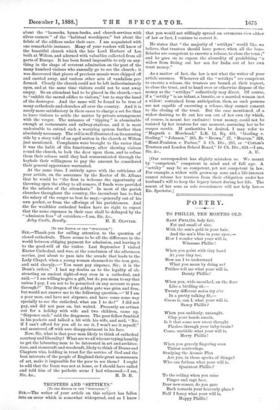TRUSTEES AND " SETTIKYS."
[TO TEE EDITOR OF THE "SPECTATOR."]
SIR,—The writer of your article on this subject has fallen into an error which is somewhat widespread, and as I know
that you would not willingly spread an erroneous view either of law or fact, I venture to correct it.
He states that "the majority of settikys ' would like, we believe, that trustees should have power, when all the bene- ficiaries are competent to execute a release, to close the trust ;" and he goes on to expose the absurdity of prohibiting "a widow from fitting out her son for India out of her own trust money."
As a matter of fact, the law is not what the writer of your article assumes. Whenever all the " settikys " are competent to execute a release, the trustees are bound, at their request, to close the trust, and to hand over or otherwise dispose of the money as the " settikys " collectively may direct. Of course, if a " settiky " is an infant, a lunatic, or a married woman (not a widow) restrained from anticipation, then, as such persons are not capable of executing a release, they cannot consent to the closing of the trust. But the case mentioned, of a widow desiring to fit out her son out of her own (by which, of course, is meant her exclusive) trust money, could not be resisted by her trustees for one moment, assuming her to be eompos mentis. If authorities be desired, I may refer to " Magrath v. Morehead," L.R. 12, Eq. 491, "Gosling v. Gosling," "Johnson," 265, Be "Brown," 27, " Beavan," 324, " Hunt-Foulston v. Farber," 3 Ch. Div., 285, or "Cotton's Trustees and London School Board," 19 Ch. Div., 624.-1 am, [Our correspondent has slightly mistaken us. We meant by competent," competent in mind and of full age. A " settiky " may be so competent, yet not competent in law. For example, a widow with grown-up sons and a life-interest cannot release her trustees from their obligation under her husband's will to keep the legacy intact during her life. The assent of her sons as sole reversioners will not help her.— En. Spectator.]










































 Previous page
Previous page